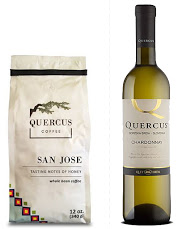The USPTO refused to register the mark QUERCUS COFFEE for coffee [COFFEE disclaimed], finding a likelihood of confusion with the registered mark QUERCUS for wine. Not surprisingly, the Board found the marks to be "highly similar." But what about the goods? Are wine and coffee related? In re Quercus Coffee LLC, Serial No. 88484601 (February 16, 2021) [not precedential] (Opinion by Judge Jyll Taylor).
Examining Attorney Crystal Yi maintained that coffee and wine are indeed related because they commonly emanate from a single source under the same name. She made of record a number of websites offering both products under the same mark: H & L (stylized), Harry & David, Hoodsport, Biltmore and Biltmore Estate, Fly Creek, Cherry Republic, Devils Gulch Ranch, Nocking Point NP, PB Pepper Bridge Winery and Vampire. She also submitted twenty use-based, third-party registrations showing registration of the same mark by a single entity for both coffee and wine. This evidence convinced the Board that coffee and wine are related for Section 2(d) purposes.
Applicant feebly argued that confusion is not likely because the goods are not identical. The Board brushed aside that assertion and, noting that the applicant and cited registration have no limitations on channels of trade or classes of consumers, found that the goods travel in overlapping trade channels (online and specialty food stores and wineries) to the general public.
Applicant insisted that the involved consumers are "well educated and not likely to purchase on impulse." However, there were no such limitations in the application or cited registration, and the Board must therefore make its determination based on the least sophisticated purchaser. Moreover, coffee and wine may be relatively inexpensive, "ranging from $15-$25 for roasted coffee and some wines offered at similar prices." Thus these products may be subject to impulse buying.
In any case, "with identical or similar marks used on such goods, even a careful, sophisticated consumer of these goods is likely to believe that the goods emanate from a common source."
Applicant pointed to the lack of evidence of fame for the QUERCUS mark, but the Board pointed out that the registrant has no opportunity to prove fame in an ex parte proceeding, and so fame is a neutral factor in the DuPont analysis. For the same reason, the lack of evidence of actual confusion is of little probative value.
The Board concluded that confusion is likely and it therefore affirmed the refusal.
Read comments and post your comment here.
TTABlogger comment: Specialty shop and wineries shouldn't count, I think. If you are in one of those, you expect the house mark to appear on everything. Not so in a supermarket.
The content of this article is intended to provide a general guide to the subject matter. Specialist advice should be sought about your specific circumstances.

